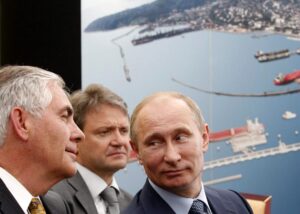Russian President Vladimir Putin said on Friday that he will not expel U.S. diplomats as a response to the Obama administration’s retaliatory measures against Putin’s election-related cyberattacks.
Russia’s foreign minister, Sergei Lavrov, had suggested that Putin meet the U.S. sanctions that were announced on Thursday in kind, but the president declined the suggestion, likely looking to cultivate relations with the incoming Donald Trump administration.
As punishment for Russia’s alleged role in the hacking during the 2016 U.S. presidential campaign, Obama announced that the U.S. is shutting down two Russian government compounds in the United States, expelling 35 Russian diplomats described as intelligence operatives, and issuing sanctions on a number of senior Russian officials and companies.
Putin appears to agree with the widespread assumption that Trump will pursue a much more Russia-friendly foreign policy than Obama, so perhaps he feels it’s hardly worth getting that worked up over measures taken by a president who’s going to be gone in three weeks.
The administration’s moves Thursday may, in fact, be as much about sending a message to the incoming administration and to Capitol Hill as it is about sending one to the Kremlin.
One major indication of just how much Trump’s Russia policy will deviate from the norm—and one area where Obama may be seeking to box in Trump on his way out the door—is Rex Tillerson’s nomination as secretary of state. The pro-Russian oil man is now sure to be asked about sanctions, Russia’s alleged role in the election, its conduct during the war in Syria, the legitimacy of its annexation of Crimea, and a host of other Russia-related issues at his confirmation hearings. A number of Russia hawk Republicans in the Senate have already expressed concern about Tillerson’s business ties to Russia and personal relationship with Putin. After Thursday’s announcement, John McCain and Lindsey Graham called for even stronger sanctions on Russia than those rolled out by Obama. (This was predictable: no anti-Russian sanctions are ever strong enough for McCain and Graham.)
Putin may not be taking those measures all that seriously, but they potentially leave Trump and Tillerson in the position of arguing to a skeptical Congress that the allegations of election hacking are no big deal.
Previous rounds of sanctions on Russia haven’t done much to alter Russian behavior. If the sanctions move Trump at all away from Russia—or increase distance between Republicans in Congress and the Trump administration on a critical nomination, or general policy toward Russia—then they may well end up being more effective.
http://www.slate.com/blogs/the_slatest/2016/12/30/obama_s_new_russia_sanctions_might_make_rex_tillerson_s_confirmation_an.html





